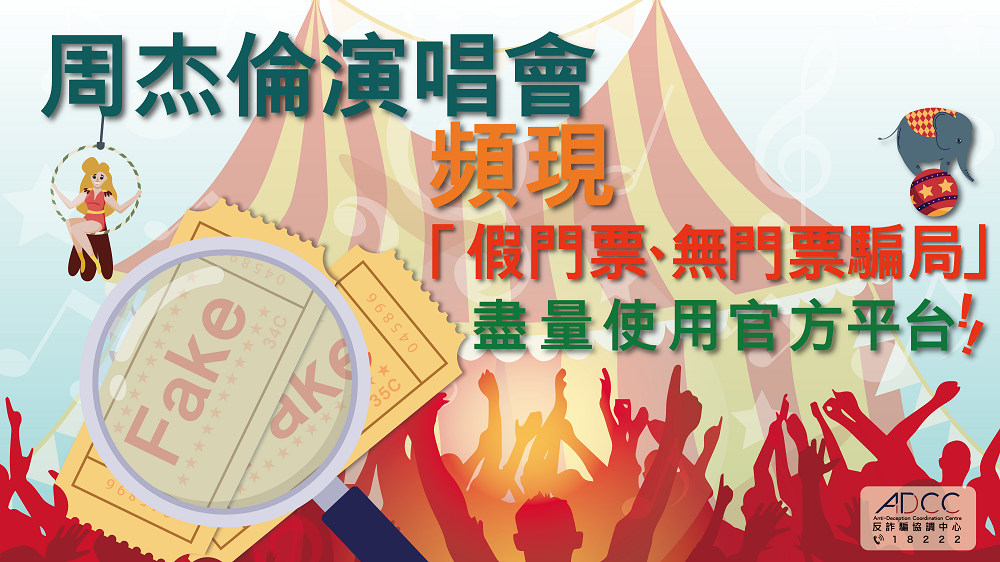“7 Major Ticketing Traps” for Jay Chou’s Concerts Frequently Seen on Carousell and Facebook
2025-06-18

A large crowd of enthusiastic fans are eagerly snapping up tickets for Jay Chou’s concerts. The Police have received a number of reports of related scam cases and counterfeit tickets, carrying out on Carousell and Facebook in particular. As a result, the Anti-Deception Coordination Centre warns members of the public to be aware of the seven major ticketing traps.
Trap no.1: Making transfers before securing tickets
Scammers take advantage of the eagerness of fans who are desperate for concert tickets and ask them to transfer payments in advance on instant messaging applications, otherwise tickets will not be reserved for them, claiming that it is a “normal online transaction practice”. Once the victims make the payments, the scammers can no longer be reached. Some promise to send the tickets a few days before the concerts, but actually they never have any tickets in the first place.
How to avoid it: Refrain from making direct transfers in transactions
Be cautious if someone asks you to pay via bank transfer, Alipay or WeChat Pay.
Trap no.2: Below market prices
Concert tickets are often in high demand. If someone sells them at prices lower than the market ones, it is highly likely to be a scam.
How to avoid it: Beware of suspiciously low prices in transactions
Trap no.3: Counterfeit or resold tickets
Scammers forge concert tickets or sell the same tickets to different buyers.
How to avoid it: Check the sources of tickets
If you buy tickets from resale platforms, you should ask the sellers for proof of purchase, such as original order confirmation and e-receipts. Additionally, you may check the ticket numbers on official ticketing websites to confirm the authenticity of tickets.
Trap no.4: False claim of abnormal transfers
Scammers trick buyers into making multiple transfers to scam them out of money by citing excuses such as “no remarks for payment transfers” and “verification is required”.
How to avoid it: Use third-party payment protection mechanism
If you buy tickets from second-hand markets, you are advised to choose payment methods with buyer protection mechanisms, such as PayPal, credit cards and third-party ticketing platforms. Such mechanisms allow you to request refunds in case of disputes.
Trap no.5: Selling tickets by impersonating official platforms, ticketing agencies, intermediary agencies, KOL and celebrities
Scammers provide seemingly genuine “screenshots of ticket stubs” and “proof of purchase”, and may even offer front-row seats and VIP boxes, claiming to have reliable ticket sources or insider access. Once the victims make the payments, the scammers can no longer be reached.
How to avoid it: Buy tickets only from official channels
When buying tickets, you should choose authorised ticketing websites or partners and avoid unofficial channels. Large-scale concerts usually have official ticketing platforms, such as Ticketmaster, KKTIX and Damai. Moreover, you should always check if ticketing websites’ URLs are correct.
Trap no.6: Free tickets
Scammers send phishing SMSs or emails and ask recipients to click on the link embedded to enter their personal information or credit card details, claiming to give away free tickets.
How to avoid it: Stay vigilant
Official ticket giveaway campaigns do not normally request sensitive information. You should verify the authenticity of websites before sharing any information.
Trap no.7: Forged QR codes
With the rise of e-tickets, scammers may forge QR codes or e-tickets and send them to victims. The victims only realise that the tickets are invalid upon entry.
How to avoid it: Buy tickets only from official channels
Please refer to “How to avoid it” under Trap no.5.





